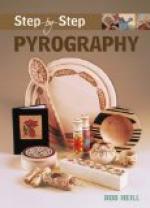Now and then in his life Alan had acted from pure blind instinct. This was the blindest, blackest place it had ever led him to. He did not hesitate. “I promise,” he said.
“Very good,” said the jester, and drummed thoughtfully upon the table. “We will begin with matters which are not bound up in your promise—for they concern your friend who desires to sift out the clerk’s tale about his mine. This is the true story. Archiater found many metals and minerals in these hills, and made some of his experiments in the ruins of an old pagan temple close to the spot where he discovered a vein of copper. He was half a winter trying out what he found, from arsenic to zircon. Simon watched him by stealth, tracked him like a beagle, and finally went to one high in authority with the report that he was making secret poisons. This would have been no crime had the poisons been available for practical use. As it was, they felt it safest to have Archiater seized when he came back to the city, and tried as a wizard.
“They ransacked his house and got his books, of course, but Simon had stolen some stray manuscripts he found in the old ruin and sold them. Nothing, however, was gained by the person who paid the money, because the writings were partly in cipher, and the key to the cipher had been burned in the public square.”
“Then the Templars may still have the manuscripts,” mused Alan disconsolately.
“Maybe,” the fool said with a little laugh, “but I said there might be something that was not a manuscript. Come you with me.”
Taking a rushlight from a shelf the jester toiled slowly up two flights of winding stairs, and then a short, straight flight of wooden steps,—opened a door, and stood aside to let Alan pass. The young man paused on the threshold in silent wonder.
The room within was not large, but it glowed from floor to ceiling like some rare work in mosaic or Limoges enamel. The walls were hung with such tapestries as Alan had seen on rare holidays in a cathedral, or in the palace of duke or bishop. They were covered with needlework of silk in all the colors of the rainbow, wrought into graceful interwoven garlands and figures. The cushions of chair and settle, the panels of a screen, the curtains of the latticed windows, displayed still more of this marvelous embroidery, subtly contrasted and harmonized with the coloring of a rich Persian rug upon the floor. The heart of all this glowing, exquisite beauty was a young girl in straight-hanging robes of fine silk and wool, her gleaming bronze hair falling free over her shoulders from a gold fillet, her deep eyes meeting the stranger’s with the sweet frankness of a sheltered, beloved child.
The jester bowed low, his gay fantastic cap in hand, all his fleering, mocking manner changed to a gentle deference.
“Josian, my dear,” he said, “this is the young man of whom I sent you word. He has traveled many weary miles to see and speak with Archiater’s daughter.”




